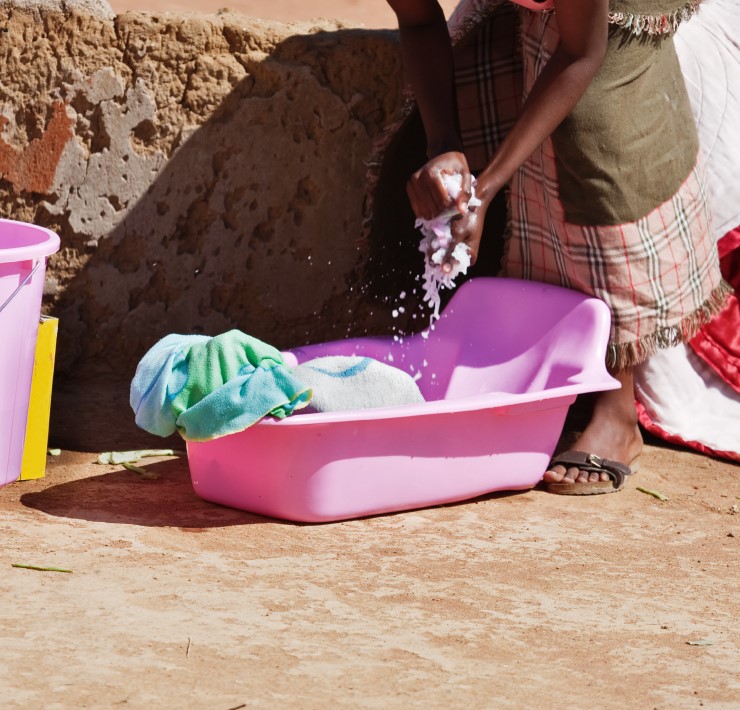In November 2022, Akinyi, a domestic worker from Kariobangi, was thrown off the fourth floor of an apartment building in Kiamaiko by her employer after she accused her of having stolen KSh 20,000. She was in her second trimester of a pregnancy. This is not the first or last of such incidents, and the collaboration and silence of local police stations and neighbours ensures that perpetrators of these kinds of violence continue to walk free.
In February 2023, Betty, another mama fua who works from within Eastleigh, was lucky to escape rape by a known sexual assaulter who preys on domestic workers. The askari of the apartment complex confirmed that this man did this all the time, and the knowing silence of the other mama fua’s who were privy to this man’s rabid insistence — as he followed Betty back to the base where women awaited work — that he would rape her and there was nothing she could do about it, further confirmed his infamy for these types of violences and the normalization of these crimes against this sector of women in Kenya.
A conservative estimate puts the number of Kenyans who died in the Middle East between 2019-2021 at 93; that is, at least 30 a year. That tally is shocking, especially as a cautious statistic, and speaks to the anti-Black racism that is normalized in the Middle East as well as our government’s approach to its own – one that continues to value foreign exchange over the lives of fellow Africans.
Kith and kin of those who travel to the Middle East in search of jobs, prompted by high unemployment — the local articulations of an anti-people political economy that exacerbates their precarity every year — are the thousands of women who await offers of temporary domestic work every day on Nairobi’s often invisible pavements yet hyper visible sun. Their daily experiences confronting abuse affirms that the conditions iconic of the Middle East, in relation to African domestic work (and labour broadly), also exist at home.
Dhobi Women’s Network
Meetings of the Dhobi Women’s Network in Bondeni, Mathare, are a register of this reality: employers who have refused to pay, sexual assault, extreme underpayment— even as low as KSh 300 a week, false accusations of theft to evade devolving a salary, extreme working hours, poor working and living conditions.
In these meetings, started in mid-2022, 25 women, predominantly Mama Fuas who look for daily assignments, meet, share, support each other to report violations at the police station and to social justice activists, and also save in their chama. Their long-term goal is to buy an industrial washing machine that they can collectively use as a livelihood strategy.
Currently, they are also working on regenerating part of a field at the Airbase community grounds in Eastleigh to use as a safe space to wait for work, plant food and also as their contribution to ecological justice.

The bulk of their work, however, is trying to make sure that their organizing is vast and powerful enough to catalyze better conditions for dhobi women in the Mathare/Eastleigh region and beyond.
Sellah Omuka, one of the core engines of the Dhobi Women’s Network, speaks of the various challenges Mama Fuas face in the area, ranging from the back breaking work without guaranteed payment, to what she referred to as thita – swollen and infected hands from all the scrubbing, to the undercutting of wages by the even more precarious underage female migrants from Sudan and Uganda; to persistent physical and sexual abuse. She asserts that “Eastleigh is another small Saudi Arabia that enslaves the dhobi women who work there.”
Through all of this, however, their main recourse is themselves – not the police, nor any of the unions whose supposed mandate should be their welfare.
Attention to the fates of Kenyans working in the Middle East is critical, especially against the necropolitical regimes they appear to be working within. But we must also recognize that here, too, we have our own Saudi Arabia’s that we have normalized.
The International Labour Organization (ILO) estimates that 13.6% of women paid employees in Africa are domestic workers. Against the dearth of data, this, the organization concedes, is an underestimation, especially in a context where “almost everyone has a domestic worker.”
So, why isn’t there due attention to their local conditions? As we highlight sinister discrimination of Black domestic workers in the Middle East, why isn’t there more media reportage and social outrage at the trafficking, psychological and physical violence they often endure in their own countries?
Certainly, Sellah and her colleagues speak, as well, of the good citizens they meet. Those who pay them what is agreed upon and respect their pricing. Employers who treat them with dignity and who, as in Sellah’s case, were passed on to her by her mother when she, a former Mama Fua, retired.
But, always visible and audible are cases like that of Akinyi who was thrown off the fourth floor of a building in Kariobangi when she was four months pregnant, or that of an unnamed Mama Fua who was killed after being hit on the head by her employer in South C when she asked to be paid her dues.
In all of these situations, it was, above all, protests by other Mama Fua colleagues who made these sinister events public, and which continue to demand that we realize that Saudi Arabia, too, is here.

